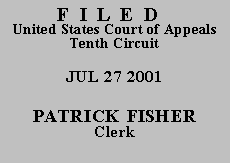

| DAVID F. HAULMAN,
Plaintiff-Appellant, Defendants-Appellees. |
No. 00-1478
(D.C. No. 00-Z-1433) (Colorado) |
After granting Mr. Haulman leave to proceed in forma pauperis, the district court dismissed the action under 28 U.S.C. § 1915(e)(2)(B) as legally frivolous. The court held that the failure to provide Miranda warnings does not give rise to liability under section 1983, and that the only available remedy is the suppression of any incriminating statements. The court noted that because Mr. Haulman entered into a plea agreement, Miranda is not applicable to his claims in any event. The court concluded that Mr. Haulman's remaining allegations did not, even construed liberally in his favor, set out well-pleaded constitutional violations.
We conclude that Mr. Haulson is not entitled to relief on his allegations. First, the law in this circuit is clear that the only remedy available for a Miranda violation is the suppression of any incriminating evidence. See Bennet v. Passic, 545 F.2d 1260, 1263 (10th Cir. 1976); accord Neighbour v. Covert, 68 F.3d 1508, 1510-1511 (2d Cir. 1995). Accordingly, Mr. Haulman may not recover damages on that claim. Second, Mr. Haulman's claims that his requests for counsel were ignored, that he was sentenced on the basis of false and withheld information, and that the district attorney tampered with a witness all directly challenge the validity of his conviction or sentence and are therefore barred by Heck v. Humphrey, 512 U.S. 477 (1994). Under Heck, in order to recover damages for an alleged unconstitutional conviction or sentence, a section 1983 plaintiff must prove that the conviction or sentence has been reversed or otherwise set aside. Id. at 486-87. Mr. Haulman has made no such showing here, and his claim for damages is therefore premature. Even if we were to construe Mr. Haulman's request for injunctive relief as asserting a claim under the federal habeas corpus statute, 28 U.S.C. § 2254, it would still be subject to dismissal for failure to exhaust available state court remedies.
Accordingly, the judgment of the district court dismissing the action as legally frivolous is AFFIRMED.
ENTERED FOR THE COURT
Stephanie K. Seymour
Circuit Judge
*.After examining appellant's brief and the appellate record, this panel has determined unanimously that oral argument would not materially assist the determination of this appeal. See Fed. R. App. P. 34(a)(2) and 10th Cir. R. 34.1(G). The case is therefore submitted without oral argument. This order and judgment is not binding precedent, except under the doctrines of law of the case, res judicata, or collateral estoppel. The court generally disfavors the citation of orders and judgments; nevertheless, an order and judgment may be cited under the terms and conditions of 10th Cir. R. 36.3.